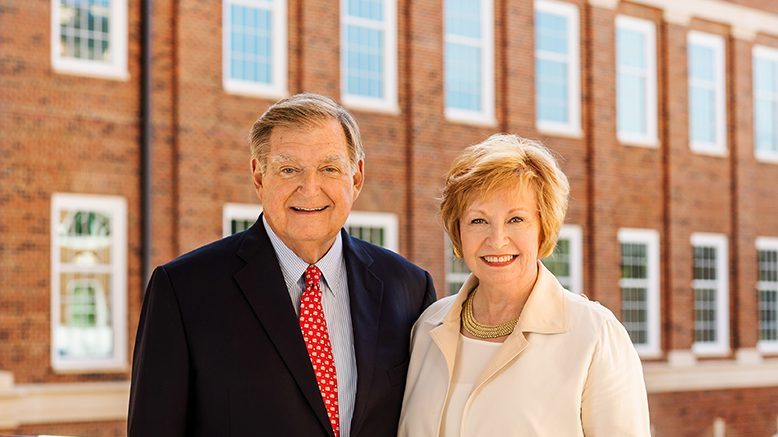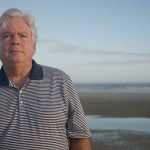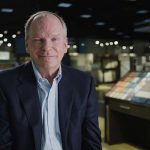You get the feeling Doug Ivester is revealing something about himself he hadn’t thought about until this moment.
It’s noticeable in the slightest of ways. He edges up in his seat. He lightly taps the table as he talks. A pause fills the space between words.
“You discover things about your life as you move forward (pause) … and I discovered once I left Coke (pause) that I do like to build things (tap, pause),” he says. “It’s really enjoyable. I like the vision of it, taking it from a vision (pause) to a concept and from the concept to the details.”
Move Forward. Coke. Build Things. Vision.
When Ivester tells his story these words return with steady ease, highlighting portions of a life with defined chapters and accomplished results. They include being the first in his family to graduate college, marrying the love of his life (he’s known Kay since they were 5 years old), becoming the CEO and chairman of The Coca-Cola Company, creating an investment firm and foundation that revived a community and benefited collegiate learning, and ensuring the educational future of children in Hall County, the place where it all began for him.
Pretty good for someone whose goal when coming to UGA in 1965 “was just being able to survive, and stay.”
“I can’t say there was this big master plan,” Ivester says. “There was a lot of serendipity, but on the other hand, there was a fair amount of initiation on my part too.”
On the ground floor in the building graced by his name in the Terry College Business Learning Community, a quote from Doug Ivester is etched on the wall. It reads “Never let your memories be greater than your dreams.”
For Ivester, his dreams never imagined a greater life.
Move Forward
Ivester’s journey starts in New Holland, Ga., a model community in Hall County built in the 1890s for the cotton mill workers of the Pacolet Manufacturing Co. When Ivester was born in 1947 the mill community was operated by Milliken Inc., a company his father worked at for 43 years. “It had churches and stores, a huge gym with a swimming pool and basketball courts, doctors, a health clinic,” Ivester says. “It had everything, it was self-contained.”
In his formative years, New Holland was the whole world, even though Gainesville was two short miles away. “When I was growing up it was mentally a long way from New Holland to Gainesville. Physically you could walk there, but as a little kid, it was still a long way. I told somebody the distance between New Holland and Gainesville back then was like the distance between Atlanta and Paris today.”
His father, Howard “Buck” Ivester, started working at the age of 9, selling apples and watermelons off a produce truck as it traveled from North to South Georgia for weeks at a time. During his teen years, Buck joined the Civilian Conservation Corps, an organization established by Franklin D. Roosevelt that put thousands to work on projects focusing on environmental conservation. Buck’s assignment took him to Lake Tahoe, Nev., where he helped build national parks. He returned years later to Georgia and joined the Army during World War II, landing in Sicily and fighting through Italy until he reached Milan in 1945. “He was in Milan the night Mussolini was hung,” Ivester says. “He saw him hanging from a light post. A little gruesome, but that’s history right there.”
Buck returned from war and married Ada Mae Pass on Christmas Eve in 1945, remaining with her until his death in 2008. Interested in a career in the technical arts, Buck went to carpentry school, plumbing school, electrician school, masonry school, and upholstery school.
“My father was an extraordinarily patient individual. He was steady, and that is a valuable trait, the consistency there,” Ivester says. “From him, I learned patience, adventure, and the ability to self-educate yourself. He could do virtually anything. He did it all, he was a builder.”
Ivester worked at a young age too, starting a grass cutting service when he was 8. His father bought him a lawnmower and told him after cutting their grass he could “use it for other places, and you have to buy the gas, but you can keep the money,” he remembers. “I was out there cutting grass, probably starting in April and running until October, every day, maybe three times on Saturdays.”
Ada Mae worked at a small motors factory, and in 1960 the family moved to Jim Hood Road in Gainesville, where Ivester’s scope expanded a little more. By then he was at North Hall High School, the county’s smallest high school, working as a Kroger cashier and developing an affinity for numbers, and cars.
He can’t point to what made him want to attend college, but he had aspirations outside the only place he knew. When asked what he wanted to do when he graduated, he said he wanted to go to the University of Georgia. “And someone said have you taken the SAT? I didn’t know what it was,” Ivester says. “I asked when do they give it, and they said Saturday. I said they’ll have to give it to me on Wednesday because I work Saturday. I didn’t have this concept that everybody had to take it at the same time.”
He got the day off, took it and got into Georgia.
What he wanted to do at Georgia was clearer, made crystal by a muscle car.
“When I got a chance I liked to carry out groceries because that’s where you got to talk to people. I go out one time and this guy had a new 1964 GTO,” Ivester says with a smile. “I’ve always been a car guy, even when I was a little kid. Every time he came in I would try to take his groceries out to see his car. At one point, I said ‘Mr. Carter, can I ask you a question?’ He said sure. I asked what do you do to afford a car like this because it was a very aspirational car. He said I’m a CPA. I didn’t know what that was. But I found out. If you can get a car like that being a CPA, that’s what I’ll do. I’ll be a CPA.”
It turns out his automotive wishes collided with his educational abilities, so while Ivester’s friends went to be scientists and doctors, he went down the accounting road. The classwork made sense to him — it was about money, a commodity he understood from an early age. What he wasn’t so sure about was how to get a job once he was done.
In the late 1960s, the accounting department was led by Dr. Percy Yeargan, and among the many accolades he accumulated during a distinguished career (including teaching at three colleges and being married to the same woman for 70 years), he was also the man responsible for getting Doug Ivester his first professional job.
“I walked into his office and asked to see Dr. Yeargan,” Ivester says. “I didn’t have an appointment but he was there and asked me what I needed. I said I need a job. He wanted to know my name, I was probably the top accounting student so he knew of my name but I never met him and never took one of his classes. I told him I wanted to go to Atlanta to work for one of the Big 8. He picked up the phone and calls somebody at Ernst, and said I got this young man who needs to be an intern this summer. They talked back and forth, he hangs up and says you can start on June 1.”
It was a summer internship, but it was all Ernst & Ernst needed to see from the young Ivester. They offered him a job upon graduation, which he gladly accepted. The week after graduation he married Kay, moved to Atlanta and started his career with Ernst.
He was 22 years old.
Coke
The path was straightforward once he got to Ernst — do this for two years, that for two years, and the road to partnership was somewhere around the 10-year mark.
“It was a great fit, I thought I’d be there forever,” Ivester says. “I never expected to go anywhere else.”
But straight paths wind as career opportunities arise, and while Ivester’s move to The Coca-Cola Company was a slow reveal, it didn’t come as much of a surprise.
For the majority of his time at Ernst, Ivester headed up Coke’s audit team, spending 1,200 to 1,400 hours a year in their building. He knew the people and worked closely with Chief Financial Officer John Collings. So when Coke’s internal audit director died, Collings came to Ivester and told him to find a replacement.
“I did a recruiting effort and put four candidates in front of him that were partners at other firms. He turned down every one,” Ivester says. “I was reasonably close to the CFO and I finally said ‘John, you got to fill this job, you have a big problem, it’s been vacant for 18 months and you must do this.’ In my opinion, he needed to hire all four of them. But he said ‘my big problem is I want you to take the job and you keep bringing me these other people. Will you take it?’ It was a Friday, I said I’ll let you know Monday. On Monday I took the job.”
Going to Coke followed Ivester’s widening-scope philosophy. Coming from a small community inside a small town, he sought experiences that broadened his world view. “I went from a New Holland scope to a Hall County scope to a UGA scope to an Ernst scope. The Ernst scope was Georgia-wide, and they sent me to Savannah and Macon and North Georgia, but I came to the conclusion that Georgia was too limited for what I wanted to learn. I needed to put myself in a scope that was worldwide, and what better place to do that than Coke.”
It was 1979 when he took the job as assistant controller and director of corporate auditing, the first step in a deliberate climb to the top:
- In 1981 he was the youngest vice president in the company’s history.
- In 1983 he was elected senior vice president of finance.
- In 1985, at the age of 37, he was named chief financial officer.
- And in 1997, he was elected chairman of the board and CEO.
His achievements at Coke are well documented, yet when asked about what he remembers, Ivester talks about what was built, and how it moved the company forward.
“We built the internal audit department. I became comptroller and we rebuilt all the systems, put in a new general ledger system, put in new data-generating systems and then along the way put in email, voice mail, all those things that ballooned in the ’80s and ’90s,” Ivester says. “Then I went to run Europe and we redid the systems there, went to USA and we rebuilt the bottling system in the United States. It was a great time. The company had great teams of people.”
For almost 30 years Coke was the main focus of Ivester’s life. It took him around the globe and opened a scope he never thought possible as a boy from New Holland. But wiser, and weathered, from a career that took him to the highest echelons of the business world, he realized he didn’t want to do this forever.
“I didn’t want to die in the saddle,” he says. “I had this vision, it might have been 55, it certainly wasn’t making the full run and dying in office.”
In December 1999, he stepped down as CEO of The Coca-Cola Company. He was 52 years old.
Build Things
“Someone said to me what do you want to do now, and I said interesting things with interesting people,” Ivester says. “Economics was less important to me then; I was not interested in making a lot more money. I wanted to go to places and experience new things and meet new people.”
After spending a career working within the confines of a company created by others, Ivester was ready to build a realm of his own. And while he devoted his life to expanding his boundaries, his aim now is centered closer to home.
Which is where Deer Run enters the frame.
He and Kay started looking for a place a few years before he left Coke, wanting to be within a three-hour driving distance from Atlanta. He had friends with ranches in the American west and houses in the south of France, but the lifestyle and activity of a southern plantation appealed to him. After inquiries for places in South Carolina, he was shown a spot in Calhoun and Baker counties in South Georgia.
“I bought it because I thought it was expandable, it was not quite as large as I wanted but it was in a territory that I liked from the activities down there,” he says of Deer Run. “It also had pecans so I could see building a pecan business out of that.”
From the 30 square miles of land Ivester built a new business — selling pecans to international markets while maintaining a tree growing business. Many of the people from the nearby town of Leary work at the farm, further building a community.
It would just be the start.
He took his next big project back to his hometown. Urged by friends to build something while he was still alive to better mold what was done with his money, the Ivester Foundation came on the scene in 2011 with goals to improve the arts and education of Gainesville.
Not that he wasn’t already doing that before the foundation.
In 1994 he created the Kay and Douglas Ivester Endowed Scholarship at Brenau College, which benefits first-generation college students based on academic performance, leadership, character, and motivation. In 2001 the Ivester Programming Endowment at Brenau supported the “high-level programs that the university would be unable to otherwise present,” according to a press release. In 2009 Ivester surprised his mother on her 80th birthday with the naming of the Ada Mae Ivester Education Center at Gainesville’s Northeast Georgia History Center. The center “provides teaching aids, resource materials and a multimedia system for classes and presentations aimed at elementary to high school students.”
But the foundation took building to another level. In the past few years, it introduced:
- The Ivester College of Health Sciences at Brenau, which includes departments in physical therapy, math and science, psychology, occupational therapy, and the Mary Inez Grindle School of Nursing, which is named in honor of Kay’s mother.
- The Ernest Ledford Grindle Athletics Park in New Holland named in honor of Kay’s father. It is the home field for Brenau’s softball team.
- And a children’s garden is being built at Gainesville’s botanical garden. It will be named after his mother and opens this fall.
“We pretty much decided we’ll take everything back to Hall County,” Ivester says. “You have to decide how do you have an impact. We concluded we would have the biggest impact by having a geographic focus on Hall County. It doesn’t necessarily mean the money has to be in just Hall County, but it has to be Hall County students.”
Back in Athens, Ivester’s philanthropy was steered toward an actual building — Ivester Hall. One of the last of six buildings built in Terry’s Business Learning Community, Ivester Hall features undergraduate classrooms, the Selig Center for Economic Growth, staff offices, and a 350-seat auditorium, named M. Douglas Ivester Auditorium.
It sits fittingly adjacent to the Coca-Cola Plaza.
“I’m amazed by it,” Ivester says of the building. “I look at it in two levels — one for the level of the sophistication of the building and the students that go there. And I can look at it from a historical perspective as to how did this happen? Did it just happen or is it the culmination of 50 years of engagement and activity? I’d prefer to think of it as a result of being engaged for those 50 years.”
Vision
This half-century engagement with his hometown continues, and will long after Ivester is not around. He built into his giving the opportunity for future generations to excel.
“We’ve studied the needs in Gainesville and decided education is a need, health care is a need, the arts have a need. We went to the Board of Education and said we’d like to do something with public education, how do we do that? They came to us and said let’s talk about Early College.”
He did more than talk, announcing a gift of $2.2 million to support the Howard E. Ivester Early College program, a dual enrollment program allowing Hall students the ability to earn college credits at Brenau, University of North Georgia and Lanier Technical College.
“It cuts your time in college by 25 percent, and in some cases will reduce student debt by 25 percent. … It has two universities but it also embraces Lanier Technical, and my father would have liked his name being involved in that.”
The Deer Run Fellows, a program Ivester created at Terry a decade ago, offers the same sort of opportunity as Early College, but instead gives college students a head start on their career. Each semester the fellowship chooses eight students to take a leadership class centering around a weekend immersion experience at Deer Run where leadership and life are discussed with select industry experts.
“It’s a way for us to utilize something we own to share experiences with people and give back at the beginning of people’s careers,” he says.
He has a vision for the center of Gainesville, buying up the south side of the city’s square for a revitalization project.
“We just closed on the land to build a three-story multi propose retail office space and eight condos in this building, I’m hoping we can revitalize downtown,” he says. “The architects said we can wear you out with details. I said you probably can’t, but I might wear you out.”
His optimism for what’s ahead was instilled in him years ago by the vision of others with that same aspirational lens. He recalls talk in the early 1980s about plans for UGA’s then College of Business Administration
“They said we have this vision of the school of business being in the top 20 in America, and I said ‘this is Georgia, guys, that’s a stretch,’” Ivester remembers. “You got Harvard, Wharton, Stanford, Chicago, Case Western. But their vision was layered — what does it take in terms of faculty, in terms of programs, in terms of facilities. You have to have the tools. You can talk all about vision and objectives but you have to put tools in place. And it’s no doubt they achieved that. So many people think greatness comes suddenly, but the 1980s were 40 years ago.”
Sometimes it’s as simple as that, pinpointing potential before anyone realizes it.
It happened to Ivester years ago when all he wanted to do was go to Georgia, even if he “can’t tell you why.”
“My field of vision was pretty narrow, as I think most people were in 1965,” he says. “We didn’t have visions of Yale and Harvard, probably nobody knew they existed, they were distant things. But the University of Georgia was extremely aspirational and fortunately, I got in. I’m always a little amazed that I got in.”
He also never left, with a name forever etched in bronze for all to see.




